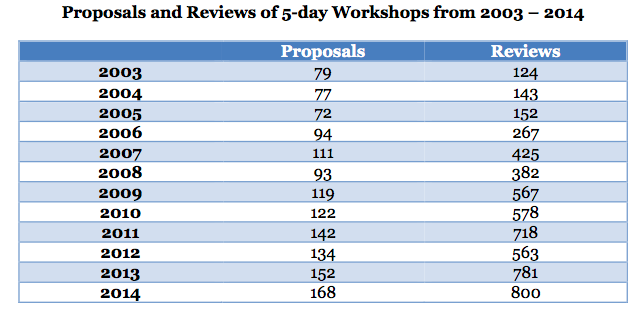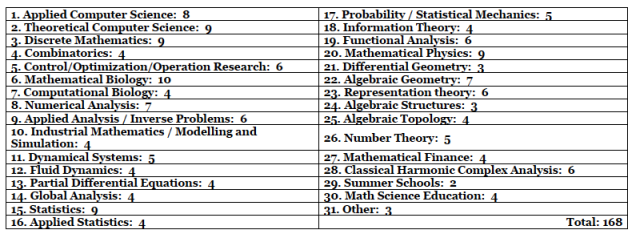The 2014 Scientific Program
We are pleased to announce the 2014 Scientific Program at BIRS!
Since its inception almost 10 years ago, the number of proposals submitted to BIRS went from 79 in 2003 (its inaugural year) to 168 this year. The extraordinary reaction to the opportunities at BIRS has led to extremely high quality competitions for the 48 slots that the Station runs every year.

This year’s competition for the 2014 program received 168 proposals submitted by 382 applicants. The selection process involved 800 evaluations by 412 international peer reviewers. By the end of the review process, 44 proposals were accepted for full 5-day workshops with 42 researchers, and 8 for concurrent 5-day workshops with 22 researchers.
The complete list is here: 2014 5-Day Workshops
This year’s proposals were catalogued in the following 31 categories:

The committee first reviews each category, linearly ranking the proposals within it. Proposals are then selected by taking the top one or two in each category. In this way — and so long as there are first-rate proposals in each area — a distribution across the mathematical sciences and their applications is maintained. The BIRS Program Committee ranks proposals by scientific excellence and relevance alone, without regard for the geographical origin of the proposal. The commitment of the organizers is also a key criterion in the selection process. In return, the limited number of allowed participants forces the organizers to continue adhering to the highest standards.
The world’s scientific community owes a great deal to the ~30 members of the BIRS Scientific Advisory Board who have done a tremendous job reviewing the proposals in their own area of expertise and inputing their comments online. But the greatest deal of gratitude is owed to the 10 members of the Program Committee who read all 168 proposals, dissected all 800 reviews by peers, and who had to meet in person on a week-end away from home and family, and deliberate for long hours in order to make the final selection in a very competitive year.
Organizers have their preferences for when they would like to run their workshops. So, we ask them to submit their 5 top preferences as well as their “impossible dates”. Once the workshop selection is made, we feed their time preferences into a Monte-Carlo based computer program, which tries to maximize the number of favorable assignments. After running 10-million iterations for about 12 hours, we were happy to see that 82.69% of this year’s proposals will have at least one of their 5 preferred choices. Our sincere apologies to those who did not get one of their preferred dates.





